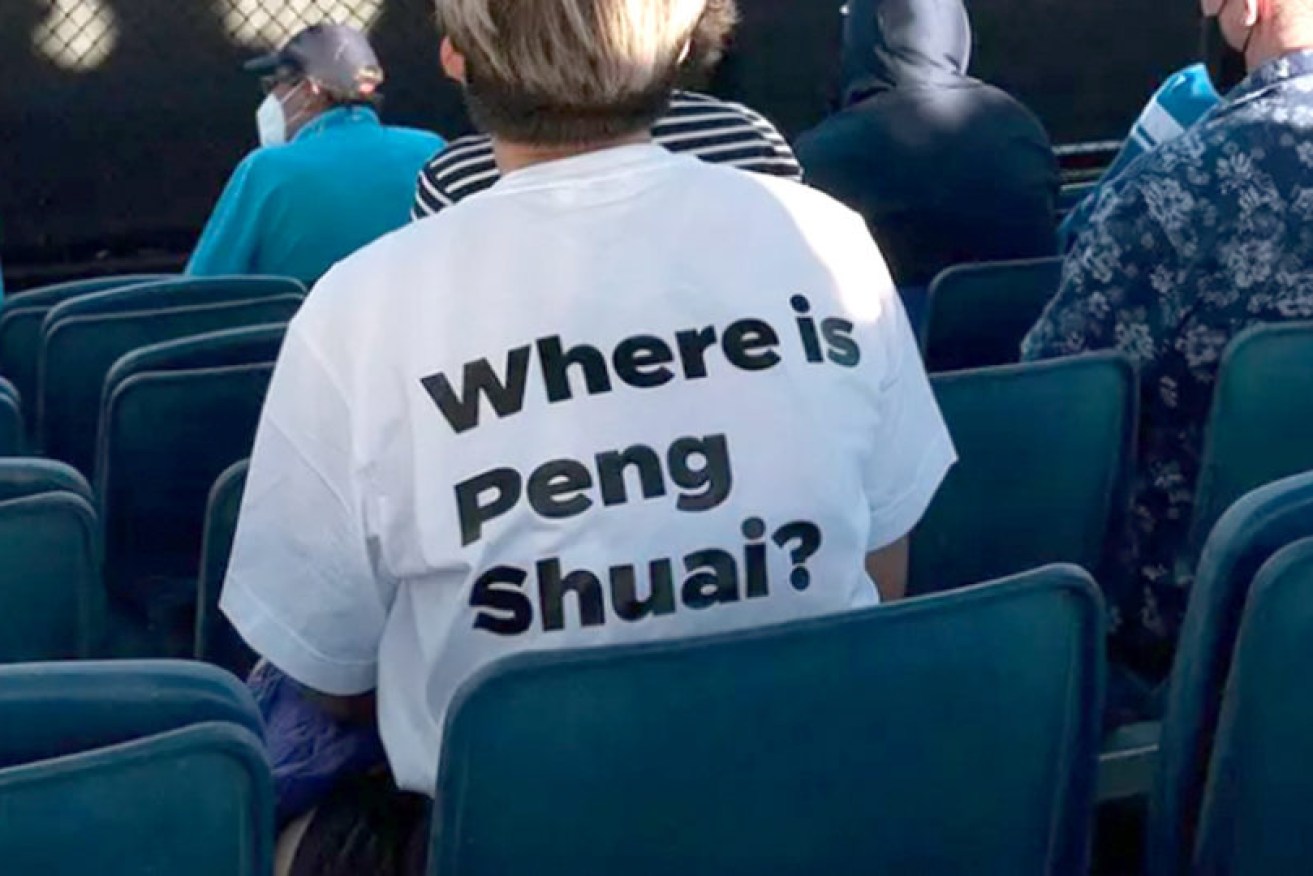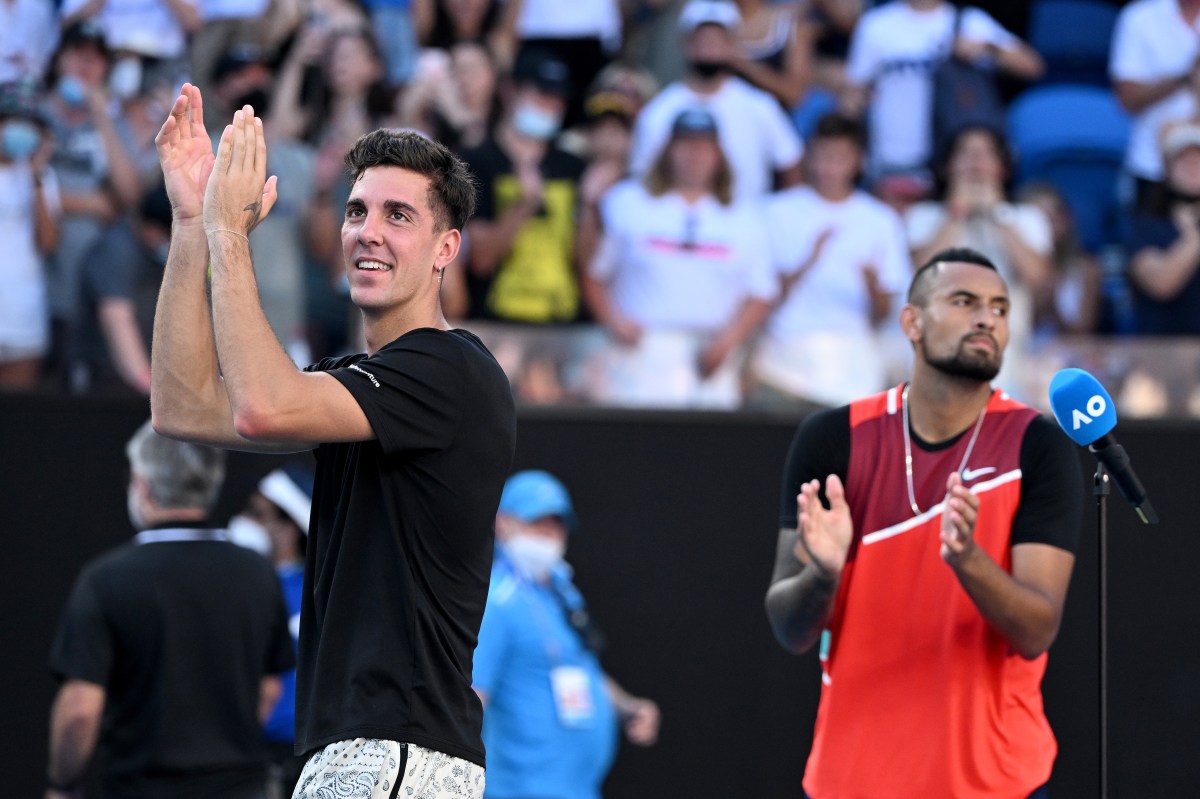Ali Clarke: When the dress code takes a sinister turn
Why are Australian Open organisers so frightened of a respectful attempt to ask a legitimate question? Ali Clarke explores the intersection of sport and politics.


Tennis fans wearing these shirts were told to take them off at the Australian Open. Photo via Twitter
Hands up who’s ever fallen foul of a dress code?
The old didn’t wear a tie, wore thongs instead of closed shoes or had a midriff cut-out where you shouldn’t have has probably left some of you with nothing more than a red face, maybe an early night and despairing looks from your wife who told you that ‘under no circumstances were you to wear that to the swanky restaurant on our anniversary’.
This week has seen a dress-code violation with much more sinister undertones.
To bring the non-tennis and non-Chinese Communist Party aficionados up to speed, Peng Shuai is an international tennis player who disappeared after it appeared she had accused former Chinese vice-premier Zhang Gaoli of sexually assaulting her.
She reappeared weeks later via Chinese state media, recanted and the post disappeared, but many are concerned that she was coerced.
Now, in January 2022, the Wimbledon and French Open double champion still has not turned up, all while the Australian Open serves on.
So while Novak Djokovic, his poor paperwork, immunisation history and father stole the headlines, another of the sport’s own was left with only human right activists trying to agitate for support, which brings us to the ‘Where is Peng Shuai’ T-shirt being taken off one of their backs by security on the weekend.
Not since supporting an idiot teenage friend at a court appearance for doing an idiotic thing have I seen such swift action taken against a top.
The bloke before my mate had turned up wearing a black shirt emblazoned with G* F*CK Y**RS*LF followed by ‘Wanna buy a vowel’ in italics directly under it.
The judge hadn’t needed his law degree and eight years practising to work out that that particular top needed to go. But I digress.
Of course, Melbourne Park security and police were just doing as they were told by following the Australian Open line that there isn’t to be any political or commercial clothing or banners flying whilst the balls are.
Apparently, it’s on the ticket conditions of entry, which of course you have all read closely any time you’ve entered a rock concert or footy stadium.
Yeah right.
It just seems incongruous that under the beating Australian sun, surrounded by people in broad hats and with the smell of hot chips wafting through the stadium, organisers could be so worried about the look of the politics, that they hadn’t stopped to read the message and therefore the room.
The Women’s Tennis Association has taken concerns about Peng’s safety seriously enough that they are refusing to play any tournaments in China, but with one of the Australian Open’s major commercial partners being a premium Chinese liquor brand, it’s been “Love All” without the affection.
Tennis legend and commentator Martina Navratilova called the organisers’ decision “really, really cowardly” and while current players send messages of support in press conferences, it’s become clear journalists can ask about this player’s welfare, but fans can’t.

Thanasi Kokkinakis (left) and Nick Kyrgios of Australia have attracted boisterous crowds – but the fans’ sometimes disruptive behaviour hasn’t been as worrisome to organisers as a legitimate and subtle political protest. Photo: AAP/Dave Hunt
To suggest there should be no politics in sport is naive and one of the great, reflexive cliches. It ignores the fact that the two have been intertwined since the first moment a pastime became organised and controlled by the ruling elite: be it women banned from watching the ancient Olympics on the punishment of death, to the splintering of the rugby codes as the northern English paid their predominantly lower-class players as they had to miss needed work for games and training.
There are periodic strikes in US professional leagues for all sorts of reasons, while every second Australian Prime Minister loves being ‘papped’ at the cricket or footy with beer in hand (and normally just after they have announced grants worth thousands of dollars to sporting codes under the guise of grassroots health for their marginally-seated couch potatoes.)
Players and individuals, too, have long used their profile to further their beliefs and political agendas whilst competing: from the black power salute raised by Tommy Smith and John Carlos on the dais in Mexico City, to Muhammad Ali being banned from boxing due to his stance against the Vietnam War, to the NFL’s Colin Kaepernick taking a knee during the national anthem as a civil rights protest.
Example after example is recorded in sporting lore, and this year’s Australian Open organisers will now have the ignominy of not just the monumental Novak stuff up, but also be known for stripping someone for free speech and then backflipping on the decision days later, supposedly thanks to new-found ‘common-sense’.
Tennis Australia’s chief executive Craig Tiley said on Tuesday while explaining their new position: “What we’ve decided is if anyone comes on the site with an intent to disrupt and use the Australian Open as a platform for themselves and really disrupts the comfort and the safety of our fans, then they’re not welcome.”
Perhaps Mr Tiley should apply that mandate to the feral spectators who’ve been yelling during points and upsetting players and fans alike, rather than someone silently trying to raise awareness on what remains a disturbing question… Where is Peng Shuai?
From next Monday (January 31), Ali Clarke will present the breakfast show on Mix 102.3. She will be a regular columnist for InDaily this year.




